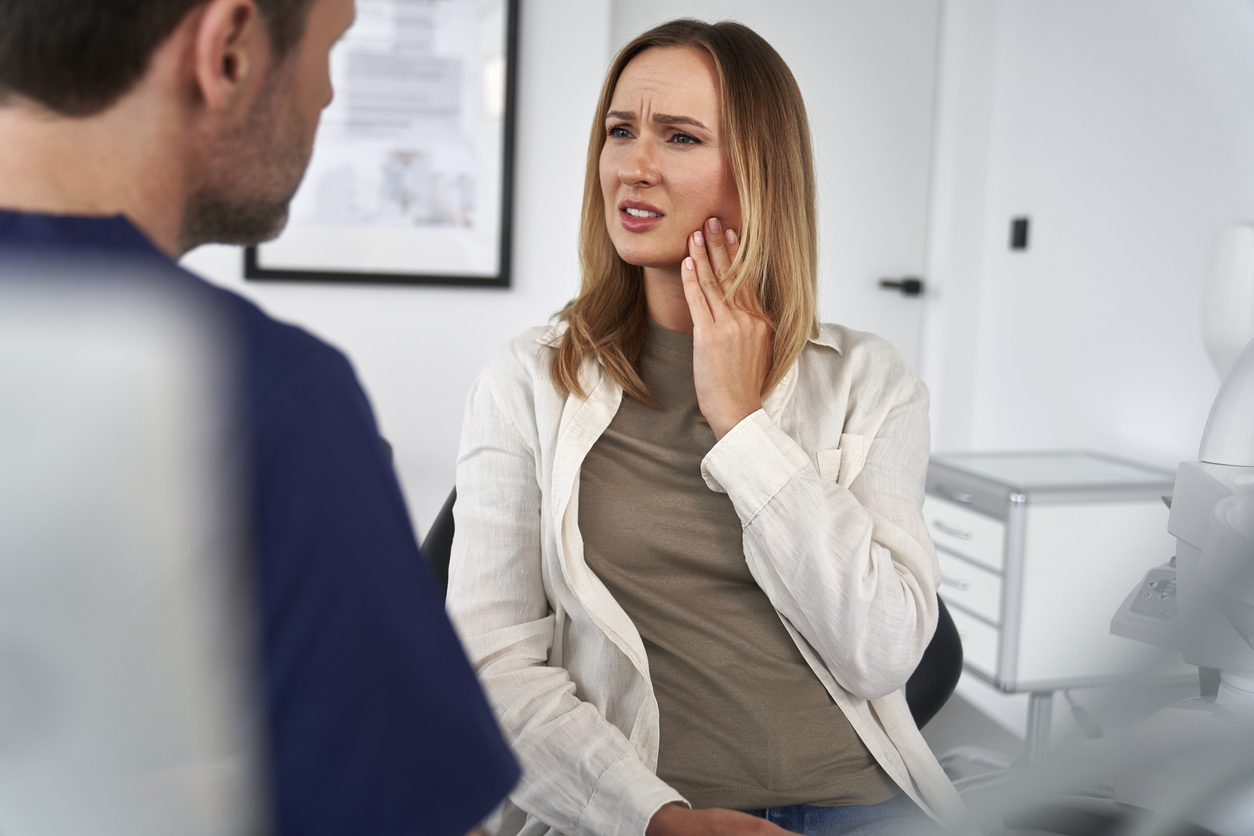What makes teeth grinding so nefarious is that many people do not realize they do it. While treatment for teeth grinding exists, first, you need to diagnose it. Knowing what causes teeth grinding can help you understand if you should ask your dentist to investigate the issue.
What Causes Teeth Grinding?
Teeth grinding, or bruxism, can happen during both waking and sleeping hours. Left untreated, it can lead to a range of issues, from wearing down teeth to a cramped jaw.
The causes of bruxism can vary from genetics to lifestyle factors. Fortunately, many of these can be addressed through simple modifications, such as treatment with a mouth guard.
Stress
The body responds to stress by remaining in an alert, anxious state. This can often manifest through muscle tension across the body, including in the jaw. Many patients only start grinding their teeth after a stressful event in their lives. For example, a recent divorce or job loss can lead to increased stress that takes months to resolve. That is plenty of time for teeth grinding to wear down your oral health.
Sleep Apnea
Sleep apnea and other sleep breathing issues have direct ties to bruxism. Unfortunately, the exact reason for their correlation is not yet determined. Some experts suspect that the mouth muscles trying to reopen the airway narrowed by sleep apnea lead to bruxism. In any case, treating sleep apnea can provide the added benefit of reducing any nighttime grinding.
However, sleep apnea is often complex. Patients benefit most from having a team of physicians, each working to address the condition from their own specialty.
Misaligned Teeth
Another leading cause of bruxism is poorly aligned teeth. Properly aligned teeth rest easily and do not crowd one another. Misalignment throws away this balance. Patients can experience jaw tension as a result of teeth that are competing for space. This, in turn, leads to grinding during the day and night.
The irony of this is that teeth grinding can also worsen tooth alignment. Orthodontic work can help immensely with this issue. Well-aligned teeth do more than make your smile look great. They actually set you up for better overall oral health.
Medication
Surprisingly, some medications meant to alleviate stress can also cause bruxism. For example, SSRIs (antidepressants) may have bruxism as a side effect. Adjusting medication dosage or switching to a different one may help. However, changing medication is not always easy, and you should always speak to your doctor before altering your medications.
Smoking
Smoking does not directly lead to teeth grinding but can result in secondary bruxism. This happens when a stimulus—smoking, in this case—leads to another condition—such as sleep apnea—that causes grinding. Smoking can indirectly increase your risk for teeth grinding by making you more susceptible to teeth grinding (and a host of other conditions).
Stimulants and Drugs
Many people with a high caffeine intake will experience some amount of bruxism. Try limiting your caffeine intake to daylight hours. While a cozy cup of coffee in the evening may sound nice, it can cause nighttime issues beyond sleeplessness.
Drugs like alcohol and cocaine can also cause bruxism. Cocaine is notorious for causing muscle tension, including jaw tension that leads to teeth grinding. Add this to the illegality of the drug and its other health risks, and it seems there is an endless list of reasons to avoid the drug.
Like smoking, alcohol can increase your risk of secondary bruxism. In addition to the substance’s other risks, it can also increase the risk of sleep apnea.
Identifying Your Cause
The first step in determining the cause of your teeth grinding is identifying which factors are present in your life. Someone who smokes, drinks coffee, and is consistently stressed will have a higher chance of grinding than someone without those factors. Each patient will have factors that a specialist can consider.
When you meet with a specialist for a diagnosis, we encourage you to answer all of their questions honestly. Your doctor will not judge you for smoking or drinking. They only want to learn about your lifestyle so they can provide optimal care. Open communication can help your doctor get to the bottom of what causes your teeth grinding. From there, they can provide a clear path forward.
The Dentist’s Role
A dentist can play a central role in reducing the symptoms associated with grinding. A mouth guard protects your teeth from nightly wear and tear.
While it does not directly treat the condition, it can provide immense relief. Comprehensive bruxism treatment involves addressing the condition based on its causes.
Work with a Leading Dentist for Relief
You can find fast teeth-grinding relief when you work with a top dentist in Culver City.



 )